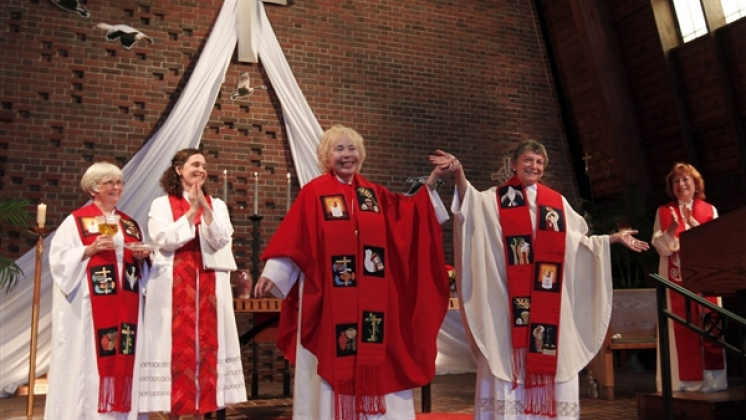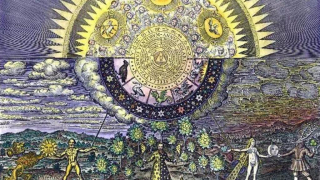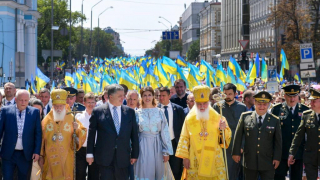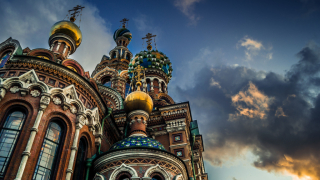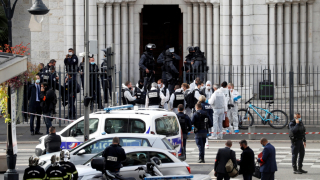The Secularisation of Religion
12.03.2018
“Please allow me to introduce myself
I'm a man of wealth and taste
I've been around for a long, long year
Stole many a man's soul to waste”
And I was 'round when Jesus Christ
Had His moment of doubt and pain
Made damn sure that Pilate
Washed his hands and sealed his fate”
We know that the Enemy of Mankind is in it for the long haul, but also that fortunately, God is in it for the longer haul. All human history should be seen in the light of this overarching Battle. Where we are now is only one tiny moment in this epic and ultimately mysterious struggle. Great over-arching theories of history such as those of Hegel and his followers have long been out of fashion, but the demise of these theories and the rise of postmodern ‘fragmentation’ and ‘subaltern stories’ in historiography should also be seen as yet another victory of the Enemy. Just as in a long and complex chess game, the Enemy will sometimes sacrifice an immediate advantage for a potential greater gain further down the line. He may also appear as he is or as a wolf-in-sheep’s clothing. What is certain is that his ultimate aim always the same; the destruction of the Church Militant (the Church on earth) and (and this is important) anyone and anything that rejects the devil’s core belief in ‘liberation from God’, that ever-tempting prospect for mankind.
The Syllabus of Errors. Error No 3: “Human reason, without any reference whatsoever to God, is the sole arbiter of truth and falsehood, and of good and evil; it is law to itself, and suffices, by its natural force, to secure the welfare of men and of nations.”
Writing now from one of the most secular countries (UK) in the so-called “post-Christian” West it is interesting to observe what has happened with the secularisation in ‘religion’ in the last fifty years as opposed to the secularisation of the state. Traditionalist Christians (henceforth simply Christians) in Western Europe often concentrate on the secularisation of the state, and with good reason. Make no mistake about it. The great mass of ‘civil society’, the state and all its organs (particularly education, academia, social services, the civil service, the health services and so on) is not indifferent to us but hates us with a passion bordering on a pathology. Hiding is no longer so easy, because their rainbow-flagged mission is: ‘seek and destroy’. This is a battle which is increasingly carried into the depths of our families and friendships so it is no wonder that a great deal of time and words have been written about it. Most recently Rod Dreher’s book The Benedict Option recommended Christians to retreat to the ghetto in order to hunker down and survive for better (or even worse) times. I will speak later about my objections to this. This focus on ‘us against them’ has obscured the far greater victory of the Enemy – “us” is no longer “us” because within all denominations and jurisdictions (and within each one of us) there is a new “secularised religion”.
Most obviously there are huge number of still existing Roman Catholic and Anglican schools and colleges which no longer teach anything resembling Christianity but instead a kind of social humanism according to the spirit of the age. These institutions are still called by their previous names in honour of the saints, but this too may change in time. These new ‘religious secularists’ are a much greater threat to us than The Humanist Society, socialists or social justice warriors. This secularised religion can take many forms but it is most prevalent in what I might call ‘mainstream church’. This is regardless of denomination for it exists in all and every place and indeed is a temptation which we must all personally fight. In this secularised church everything is for man and nothing is for God. This can take actual physical manifestations, for example in the way the altars were turned from ad orientum to ‘face the people’ after Vatican II – ie, away from God and towards man. Similarly, church buildings whose architecture was considered ‘transcendental’ were demolished en masse and in their place were built churches that looked like public toilets. The sermons preached from the pulpit or the ambon also talked less and less about the Kingdom to Come, the struggle against sin, human responsibility, free will, the impermanence of this world and the martyrs and saints who preached Christ Crucified. Instead every sermon was about the material needs of the poor, about social (worldly) injustice and about so-called ‘human rights’ and even ‘women’s rights’. They robbed Christianity of its great otherworldly Mysteries and made it just another social betterment organisation with a touch of ‘self-help’. They did this partly because they themselves gave up the faith and decided to become socialist humanists instead, they also succumbed under the huge diktat from secular world surrounding them (ie cowardice) but they also did it in the hope of ‘keeping afloat’; the result being that everyone left by the nearest door (if I want to become a cultural Marxist there are more obvious ways than becoming and Anglican).
In addition to the churches themselves there was and is still a lot of Christian cultural ‘baggage’ cluttering the secular state. So precipitous and so extreme has been the decline of religion in the West in the last hundred years that the state has not had time to divest itself of all these centuries’ old traditions.
So it is that Christian holidays still exist as national holidays and even dictate the term times in universities which today are simply indoctrination-centres for cultural Marxists. The vile secularisation of Christmas and Easter is a much bigger ‘win’ for the Enemy than if the state abolished these holidays completely and installed new ones. Something I would certainly support.
This is the form that the secularisation of religion took in the West. It has taken different forms elsewhere. In Russia, the Church is becoming dangerously close to a secular regime which ultimately cares little for its wellbeing apart from a worldly-political one. Much as I admire the position taken by Putin on so many issues: LGBT prosletysation, family values and so on, the Church needs to keep its distance from a regime which is ultimately oriented towards this world.
The question might be posed about Islam which has not experienced this secularisation, and indeed quite the opposite imperative is evident. Again we need to look at the game of chess. It makes absolute sense for the Enemy to bolster traditionalist tendencies in Islam as this a) encourages converts from the ‘best of folk’ from the degenerate West and b) clears Christians (by killing them) from huge areas of territory and c) sets up a great surge of undesirables into Western Europe. So at this stage I can see why the Enemy would not want to encourage ‘liberal-secular Islam’, although I am sure that this too will come when the time is right.
Finally, and most controversially for some readers here, I want to break down the “us and them” still further by way of some personal experiences. It should not be presumed that any denomination or jurisdiction is free from the secularisation of religion. Indeed as I said, it is a struggle we all face in our constant oscillation between the ‘cares of this world’ and the ‘mysteries of the future life’. On the other hand, the tendency is drastically more prevalent in some places than in others, and in many truly secular churches there is no mention even that this struggle exists, so subsumed in the world have they become. This secularisation tendency is evident to me in the different approaches of denominations and groups within denominations to defending the unborn. From ultra-secular pro-abortion Protestants right through to very anti-abortion Christians the language mostly and above all refers to the plight of the women who are pregnant with the other life involved coming a very poor second. But we as Christians preach a different way, a way which is not of this world. Simply because a life has no voice (and cannot scream) and is heavily dependent it is no less a life. This is what we believe. If we believed the foetus was just a part of the body and so abortion could be likened to having a toe amputated then it would not draw any protest from any of us. Yet to speak for the unborn, to bear witness for the unborn is considered at the best distasteful and at the worst (by secularists) as the deranged territory of religious freaks. Speaking personally, it has not been easy to gather interest in the cause of these helpless little souls from both the hierarchy and from other Christians. The reason given for this is that the pro-life movement is “political” which implies that the pro-life movement has a secular tendency. On the contrary, it is the rejection of the pro-life cause by these people which is secular – oriented to the mores of the world. The real reason that the hierarchies reject it is because they do not want their particular jurisdiction ‘tarnished’ with appearing to be ‘religious freaks’ and the reason why the layfolk are uneasy is also secular – they see the woman only and not the child, the obvious (worldly) and not the hidden. This is why I fundamentally disagree with Rod Dreher (on his otherwise excellent book) on his advice to withdraw from this battle.
Finally I wanted to end with two peculiar notes of hope. Things are starting to really ‘hot up’ in the West now and it certainly won’t be long before Christians will not be able to hold any kind of public position at all. The catacombs call, perhaps this will be good for us, weak and spineless as we are.
The unresting pressure from secular society has polarised secularists and Christians within denominations and the world at large. This has had the additional imperative of driving together the tiny remnant of those “who preach Christ Crucified” for all their differences in so many other respects.
I am not talking about a traditionalist ecumenism, or perhaps I am. At any rate the ways of God are mysterious.
Secondly, while secular religion has invaded every country on earth there is another just nascent movement which is born of the fact that man simply cannot live without God for very long. I would call it ‘sanctified secularism’. The most obvious representative of this has been the enormous success of Jordan Peterson. This is far too great a subject to go into here but represents perhaps the tiny shoots of recovery. It is interesting that Christianity’s greatest contemporary prosletyst is not a Christian but a secular academic.

